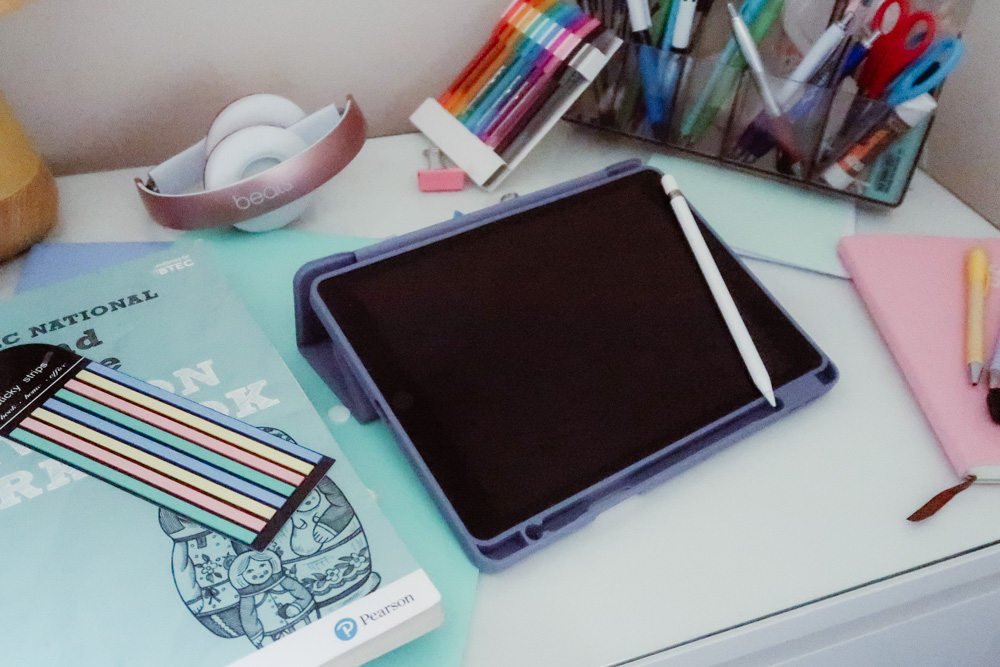AD | Partnership
The GCSEs are now completed and it is time to start preparing for sixth form or attending a post-16 college. With all children and young adults are required in England to be in a form of education until they are 18, this guide will help you prepare them for the next step in their education and how different life can be in Sixth Form and/or college education.
Before we begin can we can just take a second to acknowledge and celebrate all the hard work that 16-year-olds have just gone through whilst studying and completing their GCSEs. The first and possibly the only time that they will ever have to revise for and complete that many exams within a short space of time.
Career advice and next steps
During the last two years of high school children receive careers advice and support regarding their next steps in education until they reach eighteen. Depending on the high school they attended they may have had the opportunity to see some of their older peers make the transition to Sixth Form based within the school, whilst some may have moved on to other education options.

Post 16 Options
In England, children and young adults are required to stay in education until they are 18 years old. They are able to leave school on the last Friday in June if they will turn 16 by the end of the summer holidays. After this they must then do one of the following until they turn 18: stay in full-time education, for example at a college. start an apprenticeship or traineeship.
There are several pathways for 16 to 18-year olds to choose from, depending on what are looking to do in their future career.
- Apprenticeships – An apprenticeship is a real job where young adults learn, gain experience and get paid. They will be classed as an employee with a contract of employment and holiday leave. By the end of an apprenticeship, they’ll have the right skills and knowledge needed for their chosen career. It can take between one and six years to complete an apprenticeship depending on which one they choose, what level it is and previous experience. It’s funded from contributions made by the government and the employer.
- T-levels – T-levels are new, government-backed, career-focused qualifications for 16 to 19 year olds. They’re equivalent to three A-levels and are also backed by hundreds of British businesses, who helped to design the courses. A T-level is a two-year course that focuses on technical skills. One T-level is equivalent to three A-levels.
- A-levels – A-levels are a two-year course of study. Carry on studying subjects that they took for GCSE to a higher level, or pick new ones you may not have done before like economics, law or psychology. Most students study three A-levels, but you can also combine them with other qualifications.
- Other options – spend 20 hours or more a week working or volunteering, while in part-time education or training

Preparing for Sixth Form or Post 16 College
Once the decision has been made to attend sixth form or a post-16 college, it is all about preparing for the next step. Just like when children made the move from primary school to high school, the leap into further education can be a big one. Hopefully having accessed and visited the different educational placements in the area will have allowed them to find the establishment that suited both their educational needs and goals as well as make them feel as though they will be supported over the next two years.
Study resources
Unlike high school, Sixth Form courses generally require you to purchase study resources, guides and even workbooks for the different courses. Depending on whether your child attends the high school and will be moving up to the sixth form after the summer or whether they are starting a new establishment it is worth reaching out to their course leaders ahead of time to find out what resources and materials will be required. Not only will this allow you to ensure that you have everything required but you can hopefully get ahead of the rush to purchase the items.
Top tip – look on Amazon and similar book sites for second-hand study resources and guides to purchase them at a fraction of the cost of new books.

Technology
There is no getting away from the role that technology plays in life nowadays. Children and young adults are far more comfortable with the integration of technology in their everyday life which in recent years has crossed over to education. – where would we have been without Zoom lessons over the pandemic lockdown?
Attending Sixth Form or Post-16 education may require them to continue accessing various technologies as part of their subjects or courses. Whilst most education providers will have on-site access to laptops and technology you might wish to look into what tech they can access at home to make their studying easier and more accessible.
- Laptop – The choice between what type of laptop to use can come down to how it will be utilised, will it be mainly used for typing essays and coursework? will it be used for creative subjects and need a better graphics resolution? will be it utilised outside of Sixth Form life for gaming etc? All of these things need to be taken into consideration when looking at the specifications of the laptop in question.
If in doubt you can always see what laptops the Sixth Form or College are using and purchase something similar – after all, they must be happy with the battery life and specifications. - Tablets – Access to a tablet can provide an easy-to-use, versatile yet powerful technological solution for starting Sixth Form or college. Available in both WiFi and 3G connections you can make the choice between whether they can connect to their Sixth Form or College network to have online access, tether to their phones data plan or have a separate sim card with a data plan for their tablet.
With a range of accessories compatible with tablets, you can opt to add a keyboard attachment if they feel more comfortable typing on a keyboard rather than via the onscreen keyboard. If they are going to be doing a creative subject then adding an Apple Pencil or similar might be a great solution for them. - Headphones – It is well-documented that listening to music that is soothing and relaxing can help students to beat stress or anxiety while studying. Background music may improve focus on a task by providing motivation and improving mood. During long study sessions, music can aid endurance.
Enabling them to have access to a good pair of headphones or earbuds can ensure that they can block out the noises around them whilst they focus on their Sixth Form studies. Plus it will help them unwind after a particularly full-on day of learning new topics.

- Apps and software – Alongside accessing their Sixth Form or college emails and cloud storage they may benefit from accessing a range of other apps and software.
- Canva – a free-to-use online graphic design tool. Use it to create social media posts, presentations, posters, videos, logos and more.
- Evernote – a note-taking and task management app, you can create notes in which photos, audio, and saved web content can be embedded. Notes are stored in virtual “notebooks” and can be tagged, annotated, edited, searched, and exported.
- Todoist – a to-do list and task manager, combining tasks, projects, comments, attachments, notifications, and more. A great way to break down projects and see which elements are still outstanding.
- Zoom – after highlighting just how useful this was during the pandemic it is a great resource for any online elements to Sixth Form studies and/or for collaborating on team projects.
- Headspace – an everyday mindfulness and meditation app for stress, anxiety, sleep, focus, fitness, and more, a subscription is required after the 14 day free trial.
Stationery
Alongside the standard collection of pencil case essentials such as writing pens, pencils, rulers etc. there are a few other stationery items I would suggest purchasing. Although it is worth checking with the course leader in case there are any specific items that will be required – art supplies, math equipment etc.

- Clear Post It Notes – These transparent sticky notes are perfect for placing within study guides and resources so that you can make notes without damaging the book. As well as allowing you to copy diagrams and add labels etc which can be easily transferred into study notes or portfolios.
- Highlighters – Whether they need to highlight keywords or phrases within text or are looking to divide up study tasks, highlighters are a great way to add a splash of colour to study notes. Highlighter tape is also available to highlight areas within textbooks and study resources without damaging the books or having to copy out the section within handwritten notes. Personally, I believe it is worth having both options available but it could be something that is shared between you and a study partner.
- Coloured Document Wallets – Whether they are taking 3 A-Levels, a full-time T-Level or a combination of the two, having the ability to have each subject or project sorted within coloured document wallets will aid their organisation and hopefully ensure that they pick up the right folder each day.
Preparing to Live away from home
For some courses and subjects, it may mean that they will be living away from home for the first time. Or you are simply looking to prepare them for life after sixth form and them either heading to university or moving in with friends. There are a few key things that they will need to know to hopefully ensure that they are able to stand on their own two feet.
Life skills
Life skills can be such a big area to cover and honestly, could be a series of posts about the different areas of life that children and young adults need to be exposed to in order to understand the reality of the real world. Whilst gradually introducing them to tasks so that they don’t feel completely overwhelmed.
- Personal hygiene – something that will have been a topic of discussion across the years. Gentle reminders for the basics of washing hands, taking showers and brushing teeth. We can all hope that this would be second nature by now as they have been completely the same tasks for years but teenagers and young adults do have a tendency to be a little nose blind.
- Basic kitchen skills – whilst some children will have naturally expressed an interest in the kitchen, for others it will have simply been the place where they sourced more food and drinks. Get them used to using the kettle and toaster, and how to make simple meals beyond pouring milk on cereal and opening packets of crisps or processed foods.
- Getting from A to B – although they may have travelled by bus to high school each day, the chances are that they were surrounded by others all headed in the same direction as them. Sixth form schedules and timetables can be different to the average school day and they may find themselves having to navigate public transport timetables at unfamiliar times. Plus as they gain independence they may be travelling to work placements, volunteering sessions or catching up with friends.

Wellbeing
Thankfully over the last few years, more and more focus has been put on young person’s mental health and wellbeing. Slowly making it less of a taboo subject and one that we are beginning to talk more about. Growing up and beginning to ‘adult’ can be an overwhelming time at the best of times, add in new friendship circles, different ways of learning and potentially living away from home – it can be a confusing and difficult path to navigate.
Open communication is key and allowing them to be able to talk without judgement can really make a difference to them.
Final thoughts
Hopefully, this guide has helped you prepare your child or young adult ready to start Sixth Form or Post-16 College. Remembering that this is a big step in their lives from the traditional education that they have experienced so far and that they may need some additional emotional support in the first weeks and months will ensure that the transition from high school to fiurther education goes as smoothly as possible.































